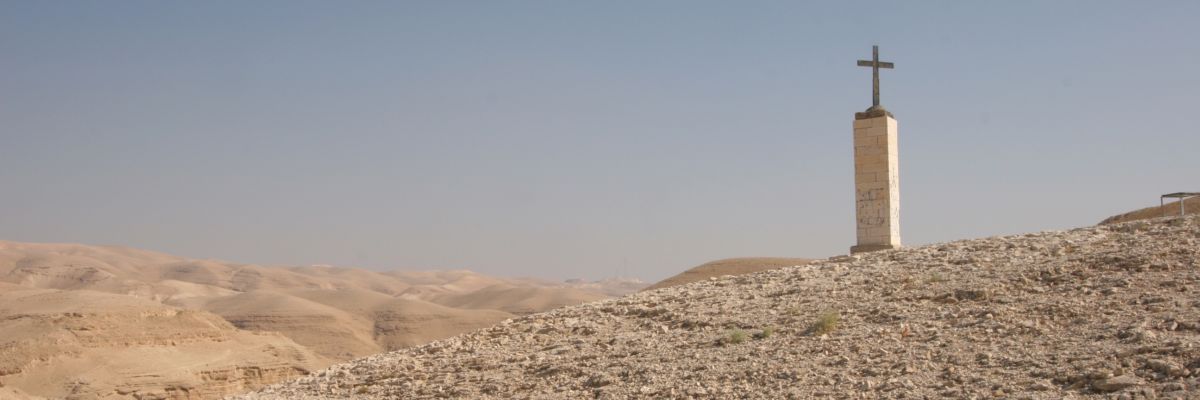
Homily for the Sixth Sunday of Ordinary Time, 2021
Rising very early before dawn, he left
and went off to a deserted place, where he prayed.
Simon and those who were with him pursued him
and on finding him said, “Everyone is looking for you.”
He told them, “Let us go on to the nearby villages
that I may preach there also.
For this purpose have I come.”-Mark 1:35-38
The man went away and began to publicize the whole matter.
He spread the report abroad
so that it was impossible for Jesus to enter a town openly.
He remained outside in deserted places,
and people kept coming to him from everywhere.-Mark 1:45
Why did the Savior so often seek the desert and solitary places?
In a very true sense, everything he did in his human nature was not for himself only, but for us, to give us an example of how to live and obtain true happiness. His words of preaching were always carried out in his example, and so he is the perfect model, joining word and deed. This is what we mean when we say that “for us men and for our salvation he came down from heaven.” Everything, even the things he did for himself, was for us.
When people go camping or hiking in the countryside or visit the mountains or the shore, they want to restore a certain balance to their lives—setting aside all the noise and distraction of city life so as to be reminded by their own senses of the basic, beautiful rhythms of nature. In a way, this love of the harmony and purity of natural beauty is a good image of love for God’s will, for his ways. We also usually want some company on our hiking or camping trip, with friends who are willing to bear up under the same inconveniences of rustic life and appreciate together the peace and challenge of the wild. Thus such experiences also strengthen the loving bond of friendship.
Our Lord went out to deserted places in order to pray for us and to enjoy the perfect conformity of his will with that of his Father, after having to deal with the human beings he came to save. He enjoined silence on those he healed, so as to give us an example of avoiding notoriety or praise when we do good. Yet he also allowed them to tell their story anyway, while he fled to the desert. This was so only those who were willing to meet him in the desert would follow, avoiding the entrapments of the city. This is how St. Jerome, the Catena Aurea, is said to have interpreted this passage:
But in that Jesus could not openly enter into the city, it is meant to be conveyed, that Jesus is not manifested to those, who are enslaved to the love of praise in the broad highway, and to their own wills, but to those who… go into the desert, which the Lord chose for prayer, and for refreshing his people; that is, those who quit the pleasures of the world, and all that they possess, that they may say, The Lord is my portion. But the glory of the Lord is manifested to those, who meet together on all sides, that is, through smooth ways and steep, whom nothing can separate from the love of Christ.
Even the very cure is meant to lead the one cured to a prayerful and quiet life in the light of the graces manifested in him by God’s mercy. St. Bede the Venerable has this confirming comment:
Even after working a miracle in that city, the Lord retires into the desert, to shew that He loves best a quiet life, and one far removed from the cares of the world, and that it is on account of this desire, He applied himself to the healing of the body.
He heals us of our ills so as to draw us more closely to himself in the solitude of prayer.
I can offer a very practical application of this lovely truth, which might be a fine Lenten resolution for us.
All the sacraments of the Church have a healing effect on their recipients. The grace of Christ is specifically ordered to the healing of weak and fallen human nature and so all the sacraments give us healing in the areas of our lives that most pertain to us.
Having received this healing, what do we do? We must retire into prayer, at least for a while in order to savor and strengthen the effects of the sacramental graces we have received.
Do I pause to thank Our Lord and commune with him after Holy Communion? This union is intimate beyond our farthest, deepest understanding. Do I just pop up out of my seat and dart out the back door of the church to attend to some other matters, or do I seek to find some time, right away or soon after, to keep company with the one who loves us? Do I speak to others about the happiness of Holy Communion so as to draw them also to rest in Christ?
The same goes for confession. Here at least we have to pause to complete our penance, but do we thank the Savior for relieving us of the heavy burden of sometimes-grave sin, or to ask his help in using the grace of this sacrament to overcome our daily faults? Do we encourage others to find healing in this sacrament, as we have? Why not suggest to a Catholic friend who has not gone in a while to come with you to confession, and then share supper together, enjoying the peace and fraternal love that flows from the Master’s forgiveness.
And let us not, finally, forget the Mother of God and our mother. Has she not chosen deserted places, the craggy mountain slopes of Lourdes, the countryside of Fatima, the rocky hills of Guadalupe, to manifest her will that we pray the rosary and find healing together, apart from the world and its seductions?
It is really all very simple. The fundamentals of our Catholic Christian life. Let us put them into practice as Lent is almost upon us!



